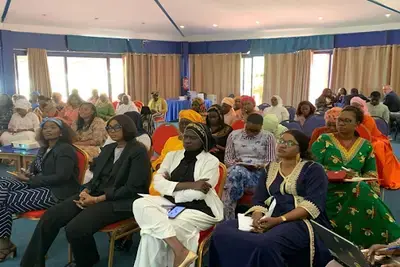
Success Story
'Small Small' Improvements to Liberian Bill Tracking Improve Transparency
Reporting from Monrovia, Liberia, Program Manager Brittany Danisch explains how small improvements to the legislature's bill tracking system have had a big impact. Listen to the audio (7:15):
A transcript follows:
BRITTANY DANISCH: There’s an expression that's used constantly here in Liberia: "small, small." It means something like “slowly, but surely.” And it's a good way to describe the progress taking place in this country since the end of the civil war in 2003.
For example, people can now go about their business freely without fear of being intimidated, arrested or even shot for no reason. Many of the major roads have been rehabilitated making it possible to move around the country to visit family or bring goods to market. And although government corruption remains an endemic problem, the legislature has passed several bills targeting graft. And the president has sacked a few high-level officials who abused their positions.
But there is still a ways to go. Some estimate that unemployment hovers around 80 percent. Illiteracy is certainly above 50 percent, and even higher for women. This is why we say "small, small." Big improvements in quality of life for Liberians will only happen over time so long as government officials remain committed to the incremental reforms already underway.
In the case of the Liberian legislature, this entails opening up the process of making laws so that government watchdog groups and journalists can keep tabs on what's happening. And so advocacy organizations can ensure that legislation reflects citizens' needs. But the obstacles can seem enormous.
There are only a handful of computers in use at the legislature. Most central staff members sit at empty desks — no risk of being labeled a bureaucratic "paper-pusher" in an institution that can't afford to buy paper, printer cartridges or other office supplies. This lack of resources makes it difficult for staff to do their jobs. Jeneve Massaquoi is the assistant secretary of the Senate:
MASSAQUOI: Sometimes the bills would get missing. Maybe, we don’t know, just get missing into thin air. We didn’t know where it was, someone saying he didn’t have the information or he didn’t have the bill.
DANISCH: Did you ever get blamed for losing the legislation?
MASSAQUOI: Oh sure! Many times [laughs], many times our jobs would get threatened and all like that.
DANISCH: Jeneve is laughing, but it was actually a serious problem. For many years, no one knew for sure where any given piece of legislation was in the process. It might be with a committee awaiting mark-up, or perhaps the only copy of the bill — no paper, remember — had been forgotten in someone's desk drawer.
Everyone was frustrated with the situation. Lack of information stymied efforts of Amos Nuakoon, a research aide for Senator George Moore, just to get his job done each day.
NUAKOON: You cannot ask your boss when you are writing a report, 'well, what's the state of the bill?' And you're supposed to be providing information to your boss.
DANISCH: It doesn't feel great to have to say, "sorry boss, can't help you out with that one." The information black hole was even deeper for civic activists and other members of the public interested in contributing to the legislative process. Jasper Cummeh heads a government accountability organization in Monrovia.
CUMMEH: It was just completely blank. It was kind of a secret process where you didn’t know where the bill was, whether it was in the committee room, or it was completed. You didn’t know where it was.
DANISCH: So, this is where things get interesting — or maybe it’s where they get boring, because with a little creativity, the solution to this problem turned out to be remarkably simple. About a year ago, the legislature, with assistance from NDI, decided to create a system to track bills as they passed through the legislative process. David Hunter, a former chief clerk of the Montana State House of Representatives and NDI consultant, advised the legislature as they developed the system. He explains how it works.
HUNTER: They record on the back of the bill each day that an action is taken for a piece of legislation. They then take that information and type it into a spreadsheet that have the significant items: first reading, second reading, third reading, then the action in the second house, signature by the president, etc. So that when you look at the spreadsheet, you can tell the last action that the legislature took on that bill, which then can be posted and distributed each day.
DANISCH: No fancy databases, no high-speed Internet — no Internet at all for that matter. The system is really just a few file folders, an Excel spreadsheet and a bulletin board. But it has had a profound impact on citizen's access to information and on the ability of staff to do their work. Oscefeah Woods manages the bill tracking system for the Senate.
WOODS: What I really love about this bill tracking system is that I was not even having the knowledge to use a computer, in fact. Because I used to use my hands to write everyday, legislations, but now I can be behind a computer to do my work. So I’m very impressed and I love it. That also brought an increase to my thinking and my knowledge.
DANISCH: The bill tracking system has also contributed to improvements in constituency outreach. Amos describes how he uses the new system to help his boss prepare to return to his district during a legislative recess.
NUAKOON: Usually during our annual break we have to go to our county to report to our people. And so we have to get track of every bill and every legislation that has been passed during the period of discussion. We have to make sure that the bossman reports on all. And before then, it was very hard for us — we have to be checking up on our files to keep track of all the bills, but this time it has been a bit easier, that now we can just go on a bill tracking bulletin where we can get all the legislators and what are the bills and it’s easy for us to go through.
DANISCH: The bill tracking system couldn't have come at a better time. In 2010, in preparation for upcoming elections, the legislature passed what was known as the "threshold bill." It created new constituencies to reflect changes in population that resulted during the war. Redistricting is complicated and politically sensitive in any country, and as Lafayette Gould, Oscefah’s bill tracking counterpart in the House of Representatives explains, Liberia was definitely no exception.
GOULD: This has been a very, very, very, very controversial bill. In fact the bill had seven to eight readings from one point to another, vetoed twice, came back, took an action, sent it to the Senate, the Senate sent their own version and, I mean, it was very controversial.
WOODS: If that threshold was not on the bulletin board, people were not even going to know what was going on. So that is the benefit we have for bill tracking on the bulletin board. For instance, somebody came to know how many times the president had vetoed the threshold bill, and I showed him where to go to get that information from.
DANISCH: Because of their success with the bill tracking system, Lafayette and Osceafah have recently been assigned the important duty of delivering approved bills to the president's office for signature. The threshold was one of the first bills to be handled under the new system. I asked Osceafah if he was nervous bringing the document to the president.
WOODS: No! Why should I be nervous? The president is our president of the nation. I feel very comfortable. I’m not nervous to give it to her.
DANISCH: His comment is a reminder that Liberians are living in a time unique in their history. Efforts to increase government transparency, such as the bill tracking system, would have certainly been been quashed in earlier times.
WOODS: In the time of the war, we could not do well what we are now doing, so we found a little bit improvement. For instance, when we were here in Charles Taylor’s time, while we were sitting here there were other people downtown fighting — bullets are flying. Or sometimes for a whole day we can’t find anything to eat. But since this government came into existence, we a little bit have a release, and things are going on fine.
DANISCH: "Small, small." Slowly but surely, Liberians are rebuilding their country. And the legislature, through transparency initiatives such as the bill tracking system, is beginning to assume its role as the people's branch of government. This is Brittany Danisch in Monrovia, Liberia.
Pictured above: Brittany Danisch
Published May 6, 2011



